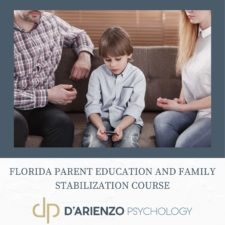- HOME
- PSYCHOLOGICAL SERVICES
- ONLINE COURSES
- Our Partnership Begins When You Purchase an Online Course
- Get to Know Dr. D’Arienzo, Relationship Expert
- Florida Premarital Preparation Online Course
- Georgia Premarital Education Online Course
- TwogetherinTexas Premarital Online Course
- Tennessee Premarital Preparation Online Course
- Minnesota Premarital Education Course Online
- Oklahoma Premarital Counseling Online Course
- South Carolina Premarital Preparation Course
- West Virginia Premarital Education Course
- Online Marriage and Relationship Tune Up Course
- Florida DCF Certified Parent Education and Family Stabilization Online Course
- Georgia Qualified Parent Education and Family Stabilization Online Course
- Texas Qualified Parent Education and Family Stabilization Online Course
- High Conflict Co-Parenting Online Certificate Course (8 Hours)
- Online Anger Management Four Hour Course (Level 1)
- Online Anger Management Eight Hour Course (Level 2)
- Sexual Harassment Online Training
- BUSINESS & PERFORMANCE PSYCHOLOGY
- CLINICAL, COUPLES, & FAMILIES
- ADHD Treatment & Evaluation Services
- Anger Management
- Anxiety Treatment & Evaluation Services
- Borderline Personality Treatment Services
- Cognitive Behavioral Therapy (CBT) Self-Help
- Couples Counseling and Marital Therapy
- Consent for Psychological Services for Minors Post-Divorce
- Depression Treatment Services
- Infidelity Recovery
- Jacksonville Counseling and Psychology
- Military Psychology & Tricare
- Narcissistic Personality Treatment Services
- Online Counseling
- Psychoeducational Testing
- Psychological Testing and Assessment
- Psychotherapy & Counseling
- FORENSIC PSYCHOLOGY & EXPERT TESTIMONY
- LIFE COACHING & EXECUTIVE COACHING
- MMPI TESTING & ASSESSMENT FOR SECURITY AND LEO
- CPI Police and Public Safety Assessment
- G License Psychological Testing
- Online Psychological Testing for Armed Security Guards and Personal Protection Officers
- MMPI Texas Level III CSO and IV PPO Psychological (ONLINE)
- Requirement for Texas Security License Applicants: MMPI Evaluation
- Level 3 Security Guard New Mexico Online MMPI Psychological Evaluation
- PSYCHOLOGICAL PUBLIC DISABILITY QUESTIONNAIRES (DBQ)
- ONLINE COURSES
- TEAM
- D’Arienzo Psychological Group Overview
- Dr. Justin D’Arienzo, Psy.D., ABPP
- Mario Decunto, LMHC
- Dr. Amy Hartley, Ph.D.
- Dr. Erica Janson, Psy.D.
- Alan Lipzin, LMHC
- Cynthia Salameh, Esquire
- Wendy Monger, Tutoring Specialist and Academic Coach
- Dr. Michael Nackashi, Psy.D., Clinical Psychologist
- Joseph Zichi, LCSW
- Mack, Roman and Roxy D’Arienzo
- MERCH & SOCIAL MEDIA
- BOOKS
- APPT REQUEST
Trauma Informed Courts
Posted by: Dr. Justin D'Arienzo, Psy.D., ABPP
Trauma-Informed Care and Building a Trauma-Responsive Court
On November 16, 2023, I (Dr. D’Arienzo) had the pleasure of presenting about Toxic Stress, Child Development, Trauma Informed Care, Building Trauma Responsive Courts, and Fostering Resilience for Attorneys and Children and Family Law Clients. I was fortunate to partner with the Honorable Judge Guy and Attorneys Ms. Dyvonnda Thurston and Ms. Sarah Sullivan. Two of my associates, Ms. Cynthia Salameh, Attorney and Parent Coordinator, and Dr. Amy Hartley, Psychologist, came to support my presentations and this Florida Bar Family Law Section Office of the State Courts Administrator (OSCA) event. We enjoyed mingling and offering our expertise to the 50 attorneys and judges who participated. I would like to thank Judge Maureen Horkan for inviting me to present!




Trauma Informed and Responsive Courts
Family law courts are often the scene of highly emotional and stressful proceedings. These proceedings can be especially difficult for individuals who have experienced trauma. Approximately 60% of adults in the United States have experienced at least one traumatic event in their lifetime. For these individuals, the stress and adversarial nature of family law proceedings can trigger trauma symptoms, making it difficult to participate effectively in their cases.
A trauma-informed approach to family law can help to create a more supportive and healing environment for those who have experienced trauma. This approach is based on the understanding that trauma can have a profound impact on an individual’s emotional, cognitive, and behavioral functioning.
Here are some of the key principles of a trauma-informed approach to family law:
Recognize the prevalence of trauma.
Understand the impact of trauma on individuals and families.
Create a safe and supportive environment for all participants.
Provide trauma-specific services and interventions.
Empower individuals and families to make informed decisions.
There are many benefits to adopting a trauma-informed approach to family law.
Improved outcomes for families.
Reduced stress and trauma symptoms.
Increased participation in proceedings.
Improved communication and collaboration.
Reduced costs to the legal system.
Here are some specific examples of how a trauma-informed approach can be implemented in family law courts:
Providing trauma-specific training for judges, attorneys, and court staff.
Creating a calming and welcoming environment in courtrooms and waiting areas.
Using clear and concise language.
Avoiding victim-blaming language.
Providing opportunities for breaks and relaxation.
Offering mental health services on-site.
Connecting families with community resources.
Implementing a trauma-informed approach to family law is a complex undertaking, but it is one that is essential to ensuring that all individuals involved in the legal system are treated with dignity and respect. By creating a more supportive and healing environment, we can help to improve the lives of those who have experienced trauma and promote positive outcomes for families.
Here are some resources for more information about trauma-informed family law:
The National Council of Juvenile and Family Court Judges (NCJFCJ): https://www.ncjfcj.org/
The Trauma-Informed Care Hub: https://traumainformedcertificateprogram.com/
The Substance Abuse and Mental Health Services Administration (SAMHSA): https://www.samhsa.gov/
- D’Arienzo Psychology: Trauma informed social investigators, clinial and forensic psychologists, parenting coordinators, and reunification therapists. https://www.drdarienzo.com
-












